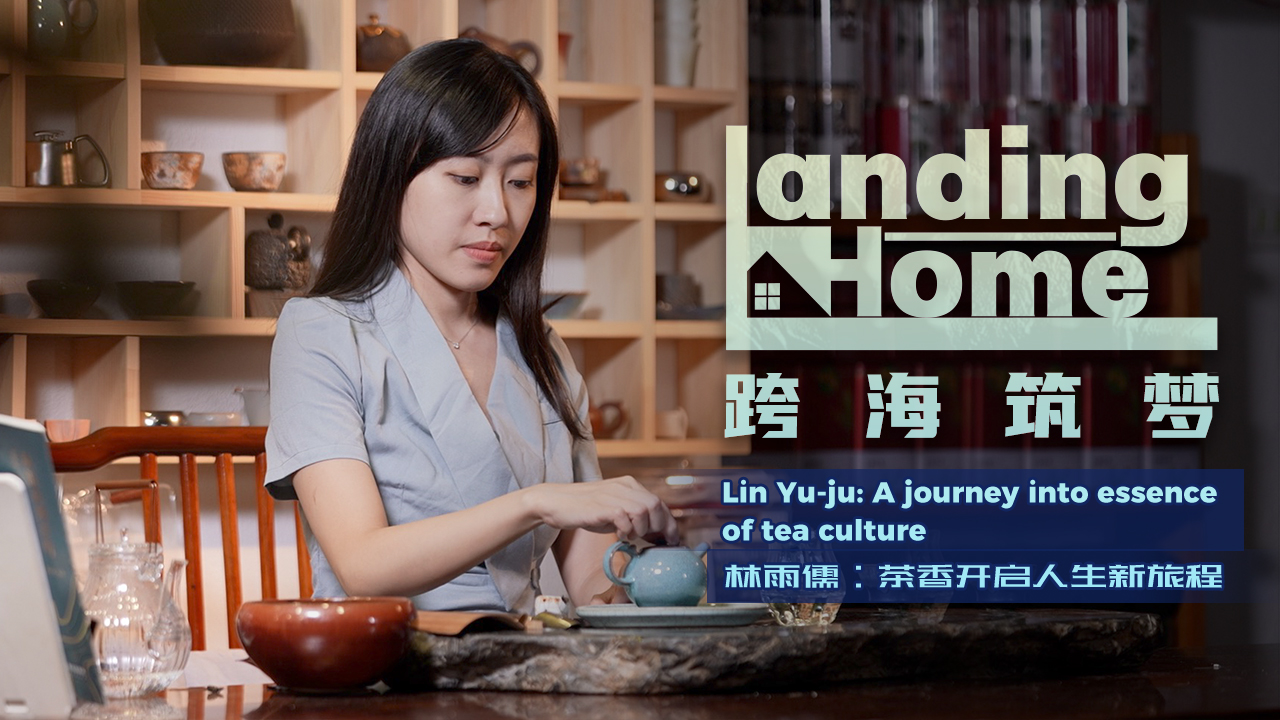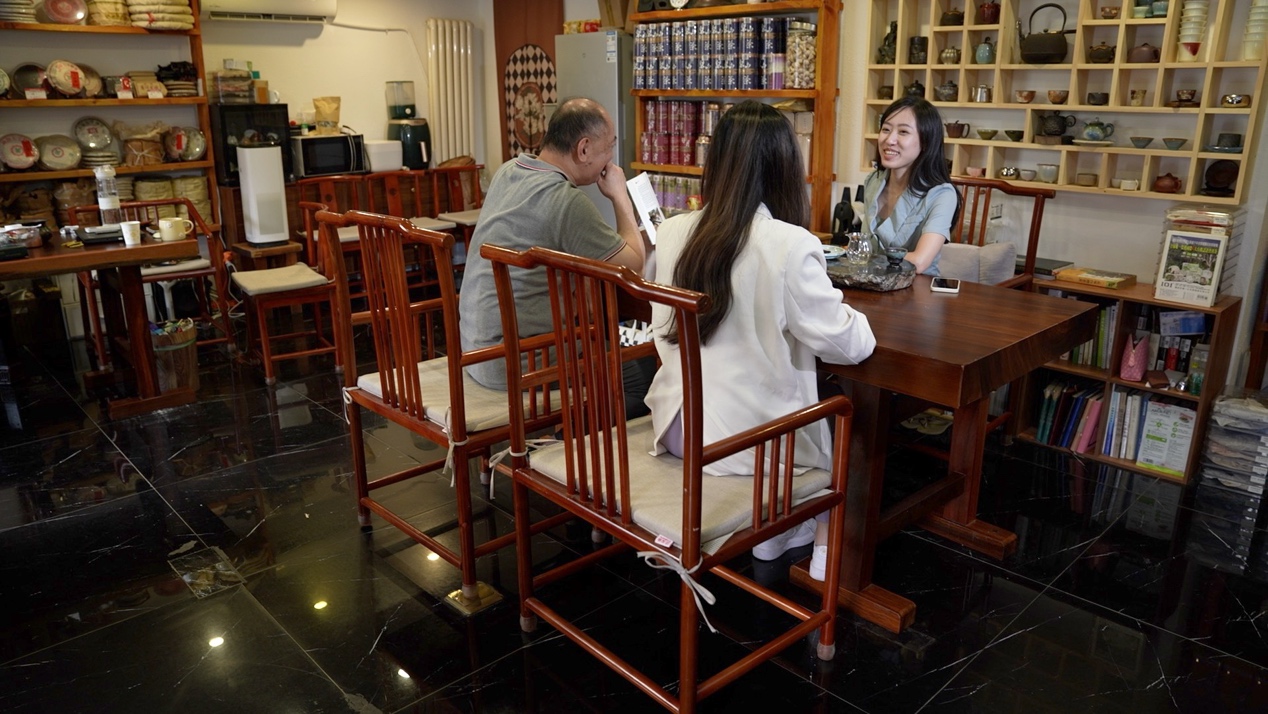06:28

Editor's note: CGTN's new series "Landing Home" profiles young adults from China's Taiwan region who live, study and work on the Chinese mainland. Chasing their dreams across the Taiwan Straits, they are professionals from all walks of life. The series spotlights their stories in, hopes for and contributions to their new home.
Lin Yu-ju's eyes sparkle when she talks about Chinese tea culture.
"The rise of the Chinese tea culture could be traced back to the Tang Dynasty (618-907), but its origin goes far back to the legendary Shennong some 5,000 years ago," Lin told CGTN.
"It bears the inheritance and succession of the traditional Chinese culture," she noted.
Tea business: A family inheritance to be passed on
"I started to drink tea since I was a kid," Lin recalled.
China's Taiwan region, Lin's hometown, is renowned for its oolong tea, one of the six major Chinese tea categories, which is also planted mainly in southeast China's Fujian Province.
Having realized that the biggest tea market is on the mainland, Lin's father started his business by selling Taiwan's black tea and oolong tea to the mainland in the 2000s, from which he made the first bucket of gold. At the same time, he also brought Pu'er tea from Yunnan Province to Taiwan region, where Pu'er tea was very popular in the 1990s.
When his business began to grow, Lin's father moved to Beijing around 2009. But he did not seek to expand more channels aside from the brick-and-mortar stores he owns in Maliandao, one of the country's biggest tea distributing centers.
The father invited his three daughters to join him on a business venture when planning to start the second store. And Yu-ju, the eldest of the sisters, didn't hesitate long before deciding to get on board. As a result, she moved from Taichung City to Beijing in 2016, leaving behind a well-paid, white-collar job with good benefits.

Lin Yu-ju is drinking tea with her father and younger sister in Beijing. /CGTN
Lin Yu-ju is drinking tea with her father and younger sister in Beijing. /CGTN
The father makes tea himself. Trusting the old saying that "good wine needs no bush," he has devoted his life to improving the taste of tea, and most of his customers are accumulated through years of business.
However, Yu-ju has a more ambitious plan for her family's tea business. She focuses more on customer feedback and improves her production accordingly. She has also been trying to build her own brand by reaching out to younger customers through digital channels.
"Many of my customers say our package is not fancy enough," she once complained to her youngest sister Ting-yu, who arrived in June to settle in Beijing.
Yu-ju has also started to explore new channels to promote tea and tea culture. The two sisters launched channels on short video platforms, sharing vlogs introducing tea culture, their daily life, and their opinions on cross-Strait topics.
Majoring in industrial design, Ting-yu is even more energetic than her elder sister and is sometimes the more motivated one of the two.
"My sister is more professional with tea, but I tend to push her into action for other parts, like filming videos and designing new packaging," said Ting-yu.
Tea culture: A tradition that bears a cross-Strait bond
China is considered the hometown of tea and the birthplace of tea culture. It is also the largest tea production and consumption country.
According to a report by iiMedia Research, China produced 3.18 million tonnes of tea in 2021, growing by 8.5 percent. Meanwhile, survey data from the China Tea Marketing Association shows that China produced 45 percent of the world's tea in 2021.
The tea market reached 291 billion yuan ($45.1 billion) in 2021 and is expected to expand to over 320 billion yuan ($46 billion) in 2022, despite the lingering impact of COVID-19 epidemic.

Lin Yu-ju and her sister Ting-yu are working on a script for short video shooting. /CGTN
Lin Yu-ju and her sister Ting-yu are working on a script for short video shooting. /CGTN
In addition, in late November this year, China's traditional tea-making and related social practices made it into the intangible cultural heritage list of UNESCO, which is expected to further boost the industry not only in China, but overseas as well.
"Tea culture is like this -- the better the economy and people's life become, the more important it becomes in our life," said Lin's father. "Tea is always one of the most important things in the life of the Chinese people."
In August, Yi-syuan, the middle sister of the Lin family, traveled to Beijing for the first time since the COVID-19 epidemic began, reuniting under the same roof to celebrate the Mid-Autumn Festival, a traditional event for family reunions.
The trio now have an even clearer blueprint for their family business. They plan to attend tea expos nationwide, learning while enjoying the scenery.
Reporter and scriptwriter: Ai Yan
Video director and editor: Yang Shengjie
Copy editors: Claudine Housen, Moosa Abbas
Photographers: Yang Shengjie, Zhang Xiulian
Cover photo designer: Li Wenyi
Project manager: Wang Yulian
Chief editor: Chen Ran
Supervisor: Zhang Shilei